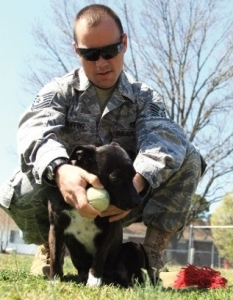Seymour Johnson AFB to offer improved veterinary services for airmen
By Kenneth Fine
Published in News on March 24, 2009 1:46 PM

News-Argus/BOBBY WILLIAMS
Tech. Sgt. Daniel Ruffino and his dog, Guido, are seen at their home on Seymour Johnson Air Force Base Monday. Base officials announced this morning that improved veterinary services are on the way.
When Daniel Ruffino picks an undersized tennis ball off his lawn, his dog, Guido, puts on his game face -- eyes focused, tongue hanging out, jaw trembling.
And when the Air Force technical sergeant releases his Boston terrier-dachshund mix's favorite toy, it starts a back and forth that only ends when the airman has had enough.
"He could do this all day," Ruffino said.
Watching Guido sprint across his yard nestled in a neighborhood on Seymour Johnson Air Force Base, you might not guess that he is 7 years old -- that he has to see the veterinarian six to eight times a year.
But Ruffino knows his beloved family member is aging.
So when he heard about the push by base officials to bring a veterinary presence onto the installation, he called it "great news."
"That's going to be big," he said. "I think a lot of people will take advantage of it."
4th Fighter Wing officials confirmed this morning that the Air Force has approved a measure to allow the Army to provide on-base veterinary care several days a week, a service they say will function much like private clinics located outside the gate.
But for Ruffino, this is no minor development.
It means his wife, Bethany, won't have to load Guido up in the family car and drive more than 20 minutes to his current veterinarian.
It means airmen under his charge won't have to miss huge chunks of the workday to take their pets in.
And for the 2,000 animals that have, within the last year, been seen at the current base facility -- one 4th Force Support Squadron deputy director Linda Edsall-Huard called "very limited" -- it means higher quality and more reliable care.
For the past several years, veterinary services have been provided on base sporadically.
"Right now, the Army is responsible for caring for the Military Working Dogs," Mrs. Edsall-Huard said. "So the military vets have been able to provide occasional clinics."
If an animal were to fall ill, whether or not help would be available on base at the time was "hit or miss," she said.
So she spearheaded an effort to provide a better system -- the one approved this morning.
No start date has been set for the new program, but Mrs. Edsall-Huard said when it does, a veterinarian will be on base two or three times a week.
Ruffino can't wait.
"Pet care, for us, is really important," he said Monday afternoon, looking down at Guido. "He's more a member of the family than a dog."
